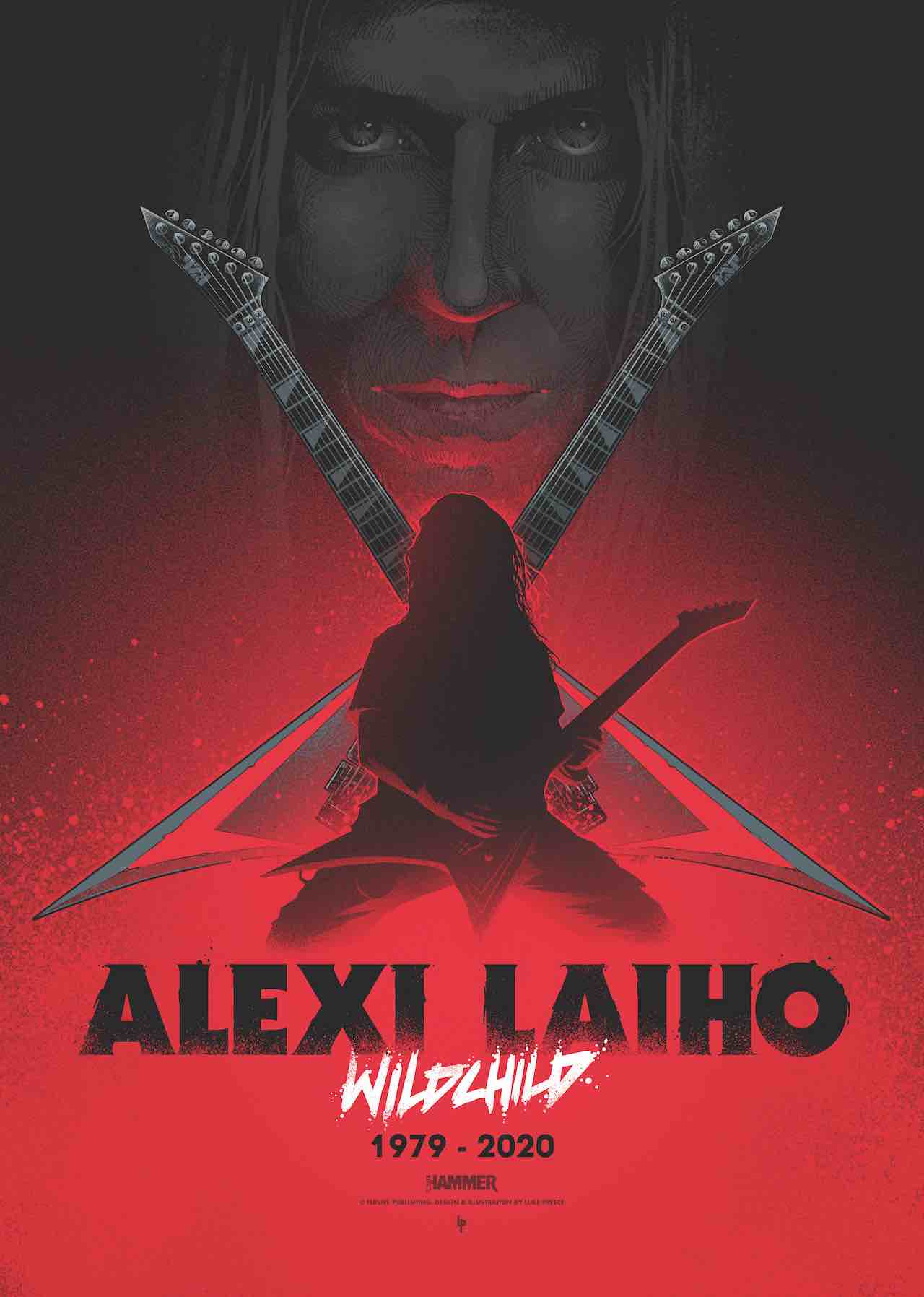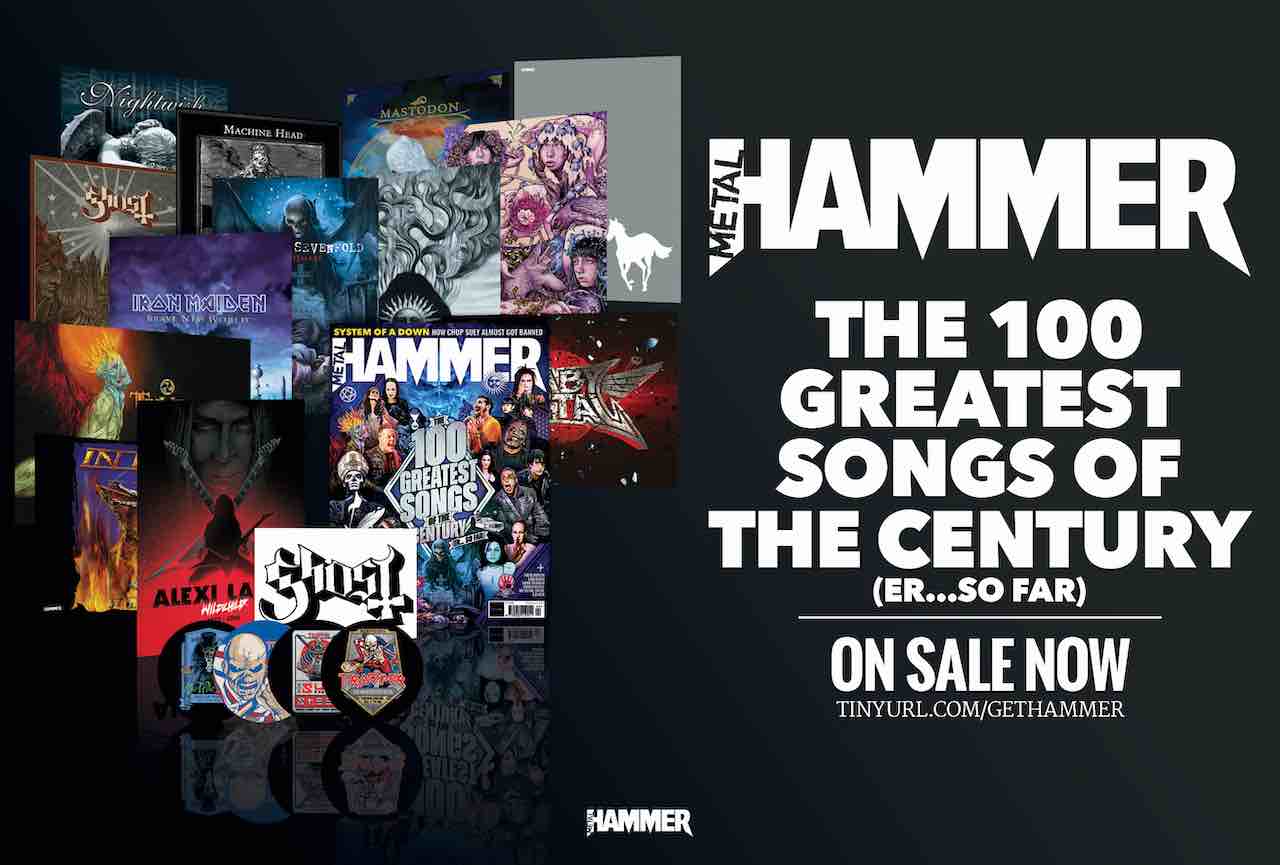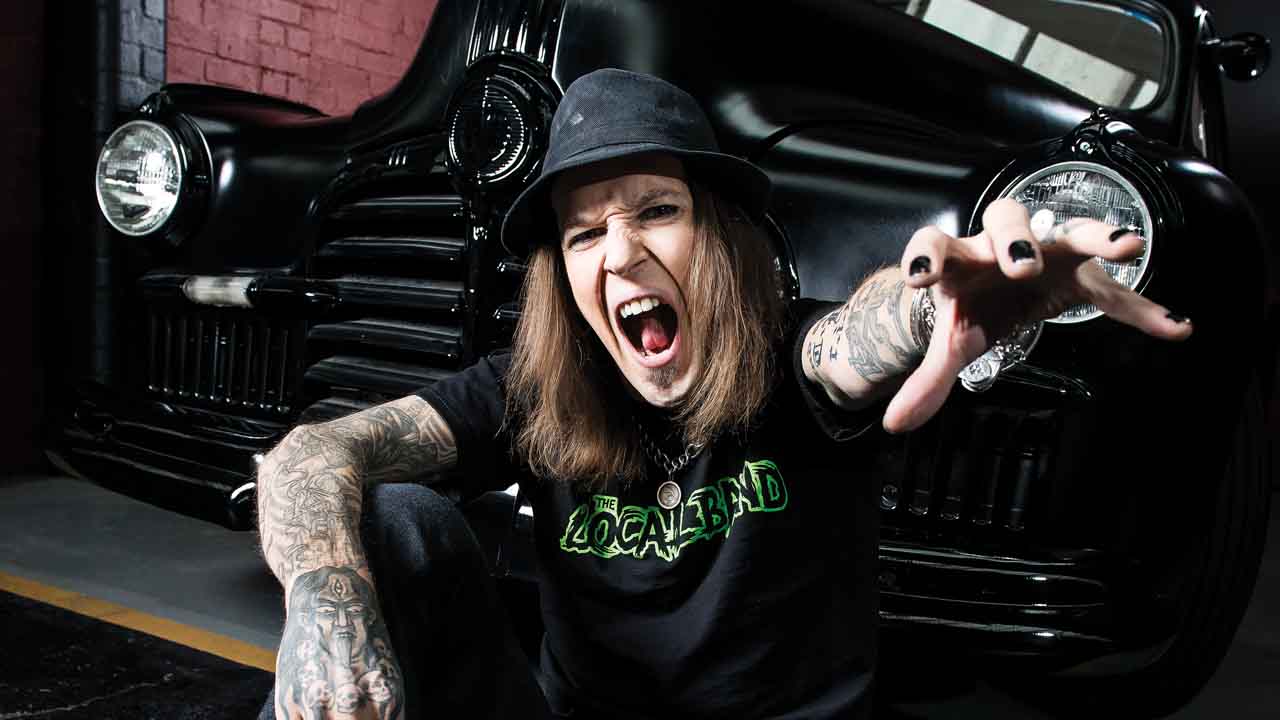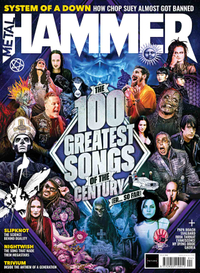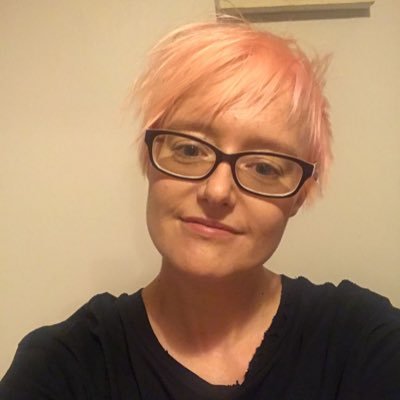Alexi Laiho was the kind of performer you didn’t forget in a hurry. On October 31, 1997, the frontman and his band, a then-unknown Children Of Bodom, were set to support Norwegian black metallers Dimmu Borgir in Helsinki. The show was a huge deal for Bodom. Dimmu were a much bigger name, having just released their third album, Enthrone Darkness Triumphant, while the venue, the Lepakko, was legendary in rock circles. They needed to make an impression.
I was definitely the best guitar player around. I could just kick anybody’s ass.
Alexi Laiho
“We could hear the opening band playing from backstage,” remembers Dimmu Borgir guitarist, Silenoz. “We were like, ‘Holy shit, what is this?’ It sounded like Yngwie Malmsteen on speed. We ran out and watched the spectacle and stood there with our jaws open…”
“There was this fucking beast on the guitar,” adds Dimmu’s then-keyboardist Kim Goss, who would go on to form power metal band Sinergy with Alexi in 1997, and marry him in 2002. “I was looking at our guitar player like, ‘I don’t know, man, you’ve got some competition…”
On January 4, 2021, when the news broke that Alexi had passed away, an outpouring of emotion ensued from the metal world. When we asked for contributions to a piece that would celebrate Alexi and his immeasurable impact on metal, we received more tributes and memories than we could hope to print in full. They all painted a picture of a man who was deeply loved and admired, and whose friendship and silly sense of humour touched everyone in his life.
“We had a secret language between us,” says Kim. “We went to Estonia together in 1998 and on the entire ferry ride there we spoke the entire dialogue of the first Back To The Future movie verbatim, not just word for word, but sound effects.”
“My favourite memory is probably the time we got these ridiculous Ali G- style tracksuits custom airbrushed for the 70,000 Tons Of Metal cruise to prank the karaoke night,” adds ex-GWAR member and costume designer, Kim Dylla. “Mine said ‘Ghostface Dylla’ on the back, and his said ‘Eazy-A, Original Gangsta 358’ – the country code for Finland.”
Those who knew him describe him as a softly spoken, gentle soul with a reckless, spontaneous side, the ‘Wildchild’ who out-partied everyone around him.
“His art was brutal and aggressive, but that was just one side of that furious, big-hearted tender guy,” says Reckless Love frontman Olli Herman, who played with Alexi in glam rock tribute act The Local Band. “He was like the big brother I never had.”
But first and foremost, Alexi will go down in metal’s history books as a modern guitar hero. In 2008, he won the coveted Dimebag Darrell Shredder Award at Metal Hammer’s Golden Gods, and the following year he was voted Best Metal Guitarist by the readers of Guitar World – but he was more than just a rip-your- face-off shredder. He was a visionary who opened the door for melody and flamboyance to infiltrate the darkest, most extreme corners of metal. With Children Of Bodom, Alexi threw together genre combinations that had never been attempted before. Black and power metal, melodeath, classical, thrash… he glued it altogether with batshit fast solos and a ‘fuck you’ attitude that inspired a whole generation of would-be players.
“There are some guitar players who treat playing guitar like a sport, and Alexi had that speed and that accuracy, but he also had such a voice to his guitar playing,” says Svalbard singer and guitarist, Serena Cherry. “Sometimes you might not know someone personally, but you feel like you know them through listening to their guitar playing. That was the case with Alexi for me. I felt all his personality oozing out of every solo that he played onstage.”
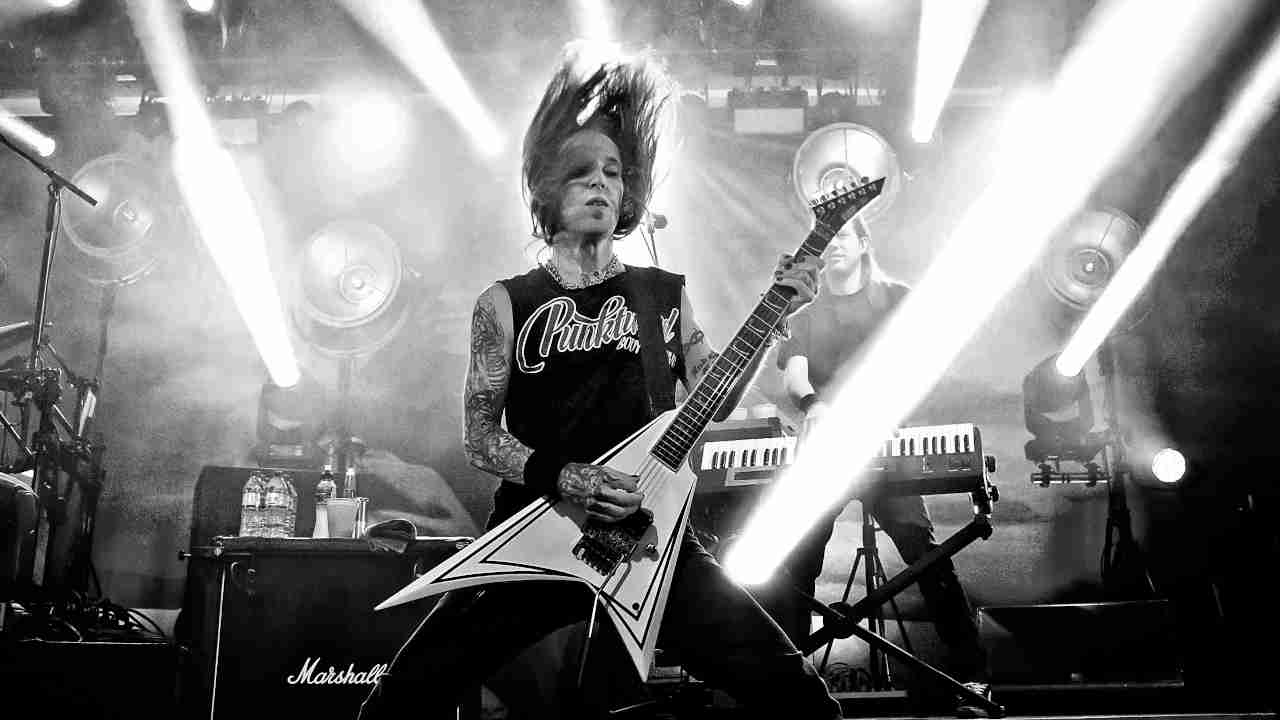
Growing up in the city of Espoo, a short drive from Finland’s capital Helsinki, Alexi was just four when he heard his dad blasting Dire Straits and immediately realised his calling in life. “I went up to my dad, like, ‘What is that?’” he told EMP Live TV. “I heard the riff, and I’m like, ‘That’s so awesome.’ I thought it was the best thing ever. He’s like, ‘That’s guitar.’ And I was like, ‘That’s what I wanna do.’ No bullshit.”
Born to musical parents who played myriad instruments, by the time he was 11, when his dad bought him his first guitar, Alexi had developed an obsession with 80s hair metal and a love for guitarists such as Randy Rhoads, Jake E. Lee, Zakk Wylde and Steve Vai. He formed his first band aged 14, and a year later, with the blessing of his parents, had dropped out of school. “I got a job and everything, but all I did was just concentrate on playing, practising, writing music.”
We heard Chidren Of Bodom and we were like, ‘Holy shit, what is this?’ It sounded like Yngwie Malmsteen on speed.
Silenoz of Dimmu Borgir
In 1993, he formed Inearthed with school friend and drummer Jaska Raatikainen. But by 1997, the band had changed their name to Children Of Bodom, signed to Spinefarm Records and unleashed themselves on a metal scene that didn’t know what the hell to make of them. Back then, extreme metal was a straight-laced, deadly serious affair while, over in the mainstream, post-grunge was where personality went to die, and there was no space for overt and intricate virtuosity among nu metal’s blunt-force posturing. Among it all, Bodom’s debut, Something Wild, landed like a blast from an atomic bomb – an adrenaline-fuelled explosion of frenzied solos, epic keys and boisterous choruses. It was fun, frantic and the sound of a guitarist doing exactly what he wanted: a defiant middle finger to trend and fashion that refused to be to be defined by the limitations of any one scene.
“There was a lot of pressure to conform, but I just didn’t care about that,” Alexi recalled. “We’re talking about a really small underground metal circuit. I was definitely the best guitar player around. I could just kick anybody’s ass, and I was appreciated for that.”
“We really liked what we were doing, but at the same time we were like, ‘What are we? What is this music?” remembers ex-Children Of Bodom bassist Henkka Seppälä. “I’m not exaggerating here; we were very sure that this would be something that would not fall into anybody’s taste.”
Alexi didn’t share his concerns. “When the [Something Wild] recording was done, Alexi printed the master CD and wrote on it: ‘The future gold-selling album,’” laughs Henkka. “He was joking, of course. We thought if we were lucky we’d sell a few hundred copies, but 10 years after, it actually sold gold.”
Finnish metal was in the middle of a renaissance in the late 90s, with bands such as HIM, Sonata Arctica, Apocalyptica and Nightwish emerging from the scene. Bodom, on the other hand, took a few years to break through. The band’s second album, Hatebreeder, built on the ideas rammed into Something Wild and was more polished in terms of songcraft, but it was 2003’s Hate Crew Deathroll that shot to No.1 in Finland and made the metal world at large sit up and take notice. That year, they were named Metal Band Of The Year at the Finnish Metal Music Awards, and were headlining venues across Europe and even Japan. Most significantly, they finally got onto their first USA tour, on a bill alongside Nevermore, Hypocrisy and old pals Dimmu Borgir.
“That was the album where we’d finally found our own path and our own style,” Alexi told Billboard in 2017. “Because up until then, we were kind of like going here and there. Sort of looking for what we’re all about. And I think on Hate Crew, we had finally captured it. That’s definitely one of not only the most important albums for Children Of Bodom, but definitely one of the best. For a lot of people, it’s their favourite record of Children Of Bodom – and I don’t blame them. I don’t mean to toot my own horn, but it is pretty fucking badass. When I look back and I listen to it, I’m like, ‘Shit, man. We nailed it.’”
As the band’s profile grew, so did Alexi’s reputation, not only as a world- class shredder but as the dude who could out-drink and out-party pretty much anyone. Enthusiastically aping the hedonistic lifestyle of his heroes Mötley Crüe and Skid Row, the stories became legendary – a catalogue of chaotic nights and boozed-up injuries that only cemented his notoriety as one of the hardest-living metal musicians of our time.
As Bodom wrapped up their tour for Hate Crew Deathroll in 2004, Alexi hit the town with some mates, later falling onto his face and breaking his wrist. The timing couldn’t have been worse. Unable to play guitar for seven weeks, the band were forced to pull out of a Dimebag Darrell tribute gig in Finland, while Alexi was due to appear on a Guitar World magazine cover with none other than Zakk Wylde and Steve Vai, two guitarists he’d worshipped since being old enough to hold a guitar. “It was insane,” he told us. “I couldn’t say no so I just got up there with a cast on my arm and they made the black eye look good.”
Zakk Wylde guffaws at the memory. “I remember he had the cast,” he says. “It was like a girl getting ready for her wedding, it’s like the biggest day of her life, and she’s got a broken arm and black eye for her wedding pictures. That was actually pretty funny, but that’s what actually makes it great.”
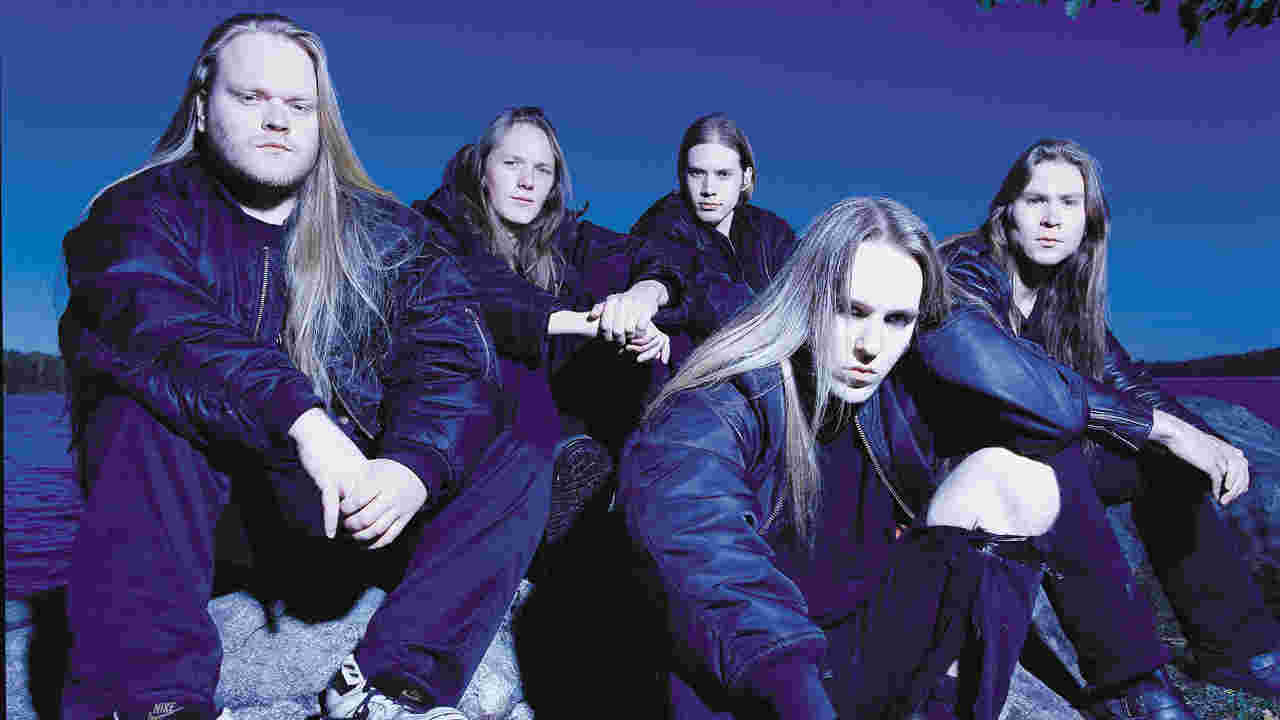
Bodom arguably reached their peak with 2005’s Are You Dead Yet?, the title track famously referring to Alexi’s hellraising antics. The album pushed them up yet another level. Then, one of the biggest metal bands on the planet came calling: Slayer, inviting them to join the 2006 edition of The Unholy Alliance Tour.
“Are You Dead Yet? was probably my favourite album by them,” says Slayer guitarist Kerry King. Even back then I was like, ‘This is the next dude, this is the next guitar hero.’ He’s one of those effortless guys that you watch and you’re like, ‘Fuck! I’ve been working all day and I can’t do that shit?’”
Joining a strong line-up alongside Lamb Of God and Mastodon, Children Of Bodom held their own against Slayer’s notoriously hard-to-impress fanbase. “They went down OK; I’ve seen people go out there and just fail miserably,” says Kerry. “Their setlist was on the heavier side, which is a smart thing to do when you’re opening for us. I was up there almost every night watching them. They’re fun to watch play and Alexi was a guitar god.”
Recalling that tour, Henkka remembers Alexi as “the guy who started the parties” and who was “really good at making friends”, not intimidated by the prospect of hanging out with the bands he had, until then, considered idols. “Many people fall into the trick that they start to drink Jäger with Kerry, but Kerry has a huge tolerance,” Henkka laughs. “There were many nights when Alexi was carried away from Kerry’s room.”
At that time, Alexi was also the ringleader of one of Bodom’s most infamous drinking traditions. “We had this ritual where whoever wanted to become a member of the Hate Crew had to come to our tourbus back lounge, get naked and stand on his head. We would pour whiskey in his mouth, which would always end up in the nose,” laughs Henkka. And who has been inducted into this crew in this manner? “At least Randy Blythe. Then after that he also got the tattoo, so he did it very officially.”
“That tour was basically summer camp,” says Mastodon drummer/singer Brann Dailor. “The Children Of Bodom guys were supposed to get a couple of cases of vodka, but the runner screwed up and got rum. I walked into their backstage room and there were 20 bottles of rum all over the carpet and they were just staring at it scratching their heads. They were like, ‘Fuck it, let’s get a blender.’ They all got hats like they were on vacation and they made rum blender drinks in their bus. It was like Mötley Crüe ’82 on steroids in their bus. All they listened to was 80s hair metal. Skid Row and Winger. I was like, ‘I got to get off this bus. I don’t want to listen to Bon Jovi anymore, guys!’”
Those kind of stories make great headlines, sure. But behind the scenes and the haze of booze, Alexi was struggling with issues that had dogged him from a young age, admitting, “My childhood was OK, but by the time I was about 17 I was pretty fucked in the head.”
The pressure of the band’s steady climb towards metal’s upper echelons took its toll. In a late-00s interview, Alexi admitted to Hammer that he had attempted suicide in the late 90s: “I popped a load of pills and drank a bottle of whiskey. Obviously, I didn’t die, but I was taken to a psychiatric hospital and had my stomach pumped. I had a complete fucking nervous breakdown.”
Over the years, Alexi would talk, always with admirable frankness, about his depression and the mental turmoil behind his music, but he often insisted it was the band that pulled him through his darkest moments: “Playing guitar is something that, y’know, if I would ever dread losing something, that’d be the first thing that came into my mind,” he told us. “I really love it and even just holding the guitar, that’s when I feel like a whole person.”
Are You Dead Yet? was Bodom’s most unabashed stab at the mainstream, and despite the boost it gave to the band’s profile, it received a mixed response from fans. In 2008, they followed it up with Blooddrunk, a patchy affair that did little to quell the feeling that Bodom’s ascent was stalling. Furthermore, Alexi’s health continued to be a cause for concern, leading to a string of cancelled appearances. In 2007 another injury, this time to his shoulder following a fall at a bowling alley, put him out of action for six weeks, forcing the band to pull out of Dubai’s Desert Rock festival. Two years later, when he fell in the tourbus, breaking his shoulder and some of his ribs, the band pulled out of their US tour with Lamb Of God, albeit not before Alexi had soldiered on for a number of shows, despite internal bleeding which left him vomiting blood backstage.
Unsurprisingly, interviews around their next album, 2011’s refocused and revitalising Relentless Reckless Forever, centred on Alexi’s state of mind. But not only was the album widely viewed as a razor-sharp and technically proficient return to the form of 2003’s Hate Crew Deathroll, it found the frontman in a much better place.
“I can’t keep up with the same lifestyle as I always did,” he told Hammer. “I can’t slam a bottle of whiskey when I get up in the morning. OK, that’s exaggerated, but you know it got pretty harsh at some point and I didn’t notice. I was still functioning as a person and as a musician, I never fucked up a show or anything, but, you know, I realised that I need to calm down, I need to take care of myself.”
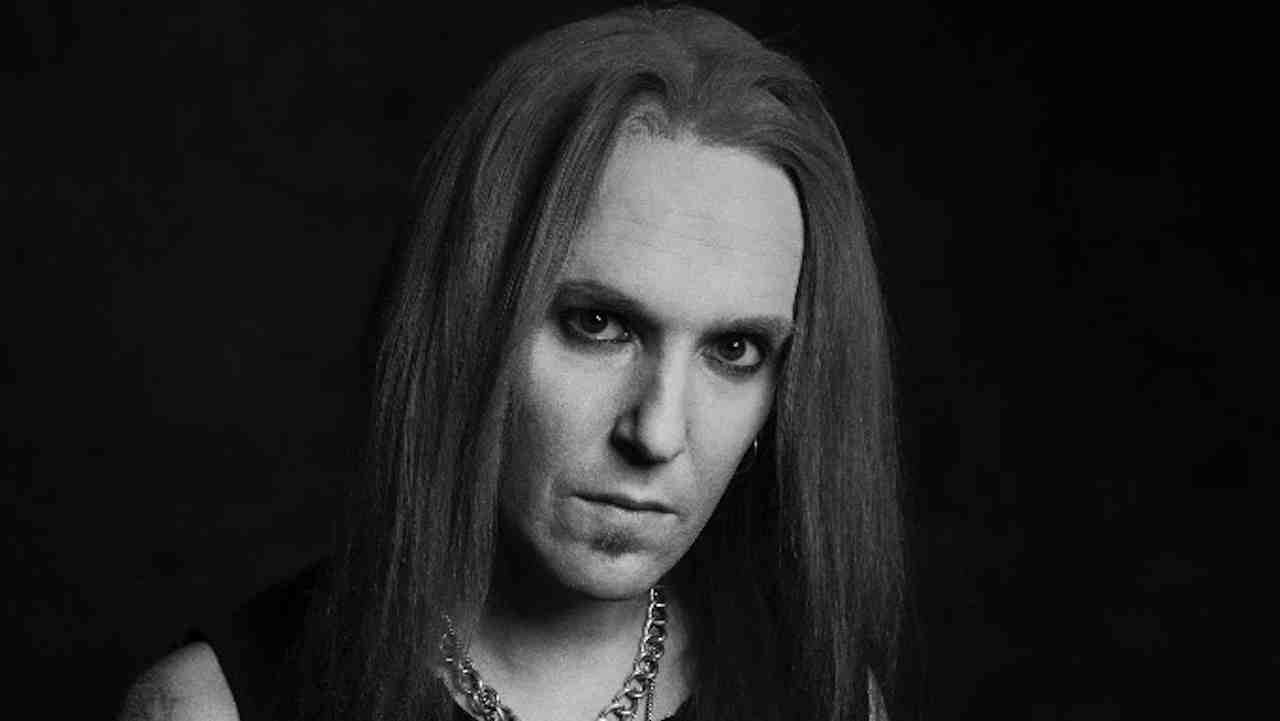
Despite the rejuvenation palpable in their later work, Children Of Bodom split in 2019, as Henkka, Jaska and keyboardist Janne Wirman announced their intention to step away from the band after more than two decades. Their last show was at the Helsinki Ice Hall on December 15. “We did everything we always do,” says Henkka. “We did the fist-bumps before the show, hugged after the show and said, ‘See you around.’ Everyone was happy and the spirits were good. Of course it was sad too, because we knew we were not going to play again together, but we pulled it off.”
Unable to continue using the COB moniker due to copyright issues, Alexi formed new band Bodom After Midnight with remaining guitarist Daniel Freyberg, plus new drummer Waltteri Väyrynen, ex-Santa Cruz bassist Mitja Toivonen and COB touring keyboardist Lauri Salomaa, and prepared to launch an entirely new chapter of his career. In October 2020, they performed three tiny gigs in Finland. “We were supposed to start writing the record, record that this year and release it in 2022, but it wasn’t meant to be,” says Daniel sadly. “He was very excited. He had new drive, new motivation and he really wanted to show that he could still kick ass.”
“He was so happy those gigs happened at small clubs,” adds Kim Goss. “He was like, ‘Fuck fancy.’ He played sharp, he sang great and his new line-up was killer. I know he’s so proud those gigs are the last three gigs that exist in this world. It took him back to his roots: small clubs, great energy and new energy.”
It’s heartbreaking to think we will never get to feel Alexi’s electric presence onstage again, see him frantically tearing up the fretboard at a demented speed, and hear those squealing solos that earned him his place among the all-time greats, so full of life and joy.
“You see people like Steve Vai and Zakk Wylde, heavy metal superstars,” says Olli Herman. “Alexi was in the same level with those guys. He was amongst them.”
Alexi left us far too soon, but we will remember him as a once-in-a-lifetime player who broke down barriers, changed metal for the better and inspired the next generation to blaze trails. Of course, none of that was important to him. Humble to the very end, it was always the music, not accolades or legacies, that mattered.
“I don’t do this shit for the awards or for the compliments,” he told us. “I do it for the music and for the love of playing. End of fuckin’ story.” What a legend.
Published in Metal Hammer #345

Get your free Alexi Laiho art print!
